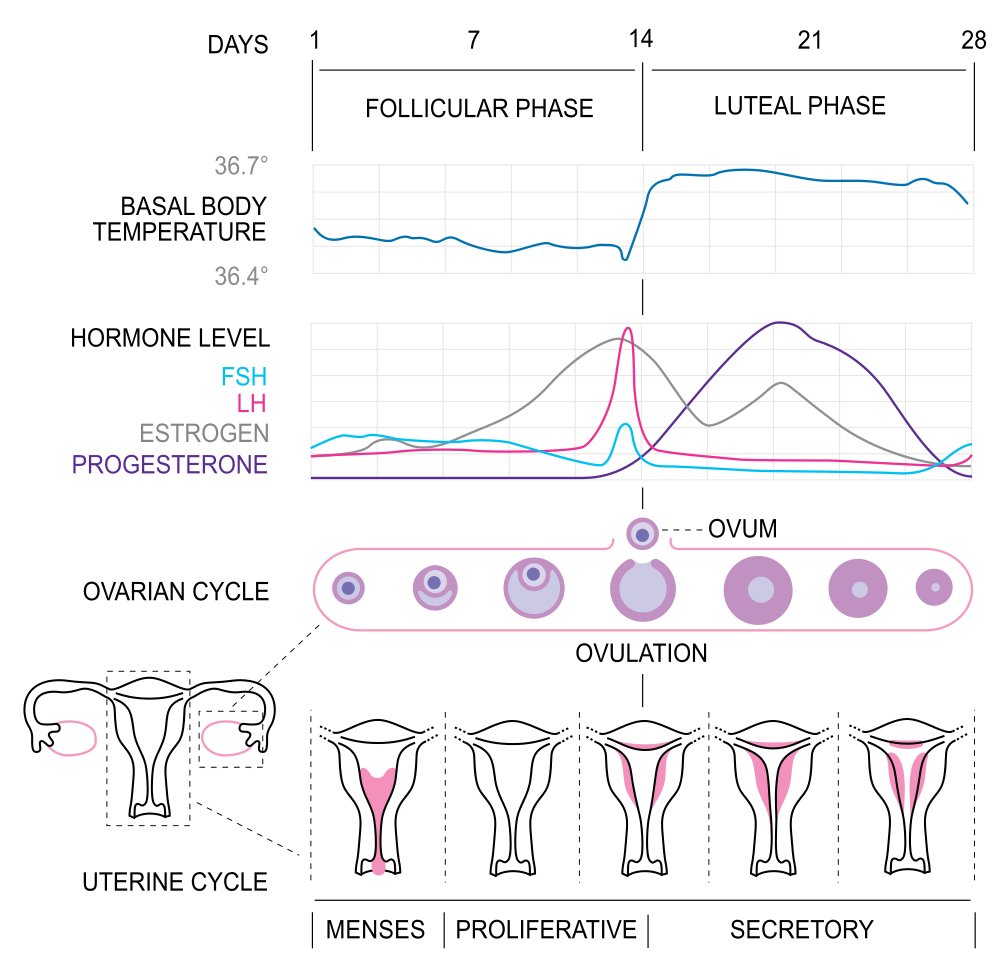Birth control is one big area where many people, even if they have an organic approach to many other areas of their lives, default to pharmaceuticals.
I was 16 when my cycle lasted 4 straight weeks and I went running to the obgyn. I was recommended the birth control pill by my doctor. From 2007 to 2015, I took synthetic estrogen and progestin combination dosage orally for 3 weeks out of every month.
That’s 320 weeks of ingesting hormones.
Doctors often offer up the pill in response to common complaints, such as acne, heavy menses, PMS symptoms, or irregular periods. And yes, the pill can help with all of those symptoms for some women, but this approach certainly doesn’t address the underlying cause.
I didn’t think twice about oral contraceptives until I started experiencing mid-cycle bleeding in 2014. I went running back to the obgyn because I wasn’t sure if it was necessarily abnormal, but it sure as hell was ruining my underwear! For the next year, my obgyn changed my birth control every 3 months with no relief. Talk about a hormone nightmare! She finally suggested for me to cycle off birth control for one month before beginning tests for an ovarian cyst. During that one month free from synthetic hormones, my mid-cycle bleeding disappeared…
That’s when I began to question why I wanted to consume oral contraceptives. My chiropractor suggested I research the Fertility Awareness Method and after doing so, I decided it was best for my health.
A common misconception about birth control lies in thinking that it actually regulates hormones, which it does not. Rather, birth control suppresses your hormones, eventually turning OFF your hormone production. The process of birth control is like asking the body to stop cycling (stop menses); which is the same as asking the body to pause menses; which is the same as asking the body to go into menopause.
And women are on birth control for 5, 10, 15, sometimes 20+ years. In menopause for YEARS. And when women come off birth control, they wonder why they struggle to become pregnant. They wonder why they struggle with fertility, after they have asked their bodies to be infertile for years. Years.
Rest your heart. In most cases of fertility, hormone balance can be restored. We will discuss this at length. Today we need to understand what birth control does and how the body is effected by it.
There are other misunderstandings we need to clarify when discussing birth control. First and foremost, cycling is extremely important for a woman. A period allows the female body to cleanse, shed, detoxify, purify, release, and balance. It prepares the uterus to hold life. To build a lining, to strengthen the muscle, to perfect the womb. Not allowing ourselves to bleed undermines some of the most creative and healing cycles of the female form. Birth control puts women in menstrual and fertile suppression.
Second, a woman does not have a true period on birth control. Bleeding on birth control is withdrawal bleeding, not cyclical bleeding. Hence, a women will not cleanse, balance, detoxify, etc. The following is an explanation of menstrual suppression from the Association of Reproductive Health Professionals.
Understanding Menstrual Suppression:
“Menstrual suppression, sometimes called ‘skipping your period,’ is a way of using certain types of hormonal birth control to avoid having monthly bleeding. With many birth control pills, women take three weeks of pills containing active hormones, which prevent pregnancy by stopping ovulation (when an egg is released from a woman’s ovaries) and keeping the uterine lining thin. During the fourth week of their cycle, women take pills that do not contain active hormones; this is the time when they experience bleeding. This mostly bleeding is not a ‘true’ period; instead, this is withdrawal bleeding – the body’s reaction to not having the hormones it gets the other three weeks of the cycle.”
Consider a normal cycle:

At the beginning of the cycle, the ratio and balance of estrogen and progesterone communicate with the pituitary to release FSH (Follicle Stimulating Hormone). The ratio of estrogen and progesterone significantly alters and signals to the pituitary that the follicle is fully developed and it is time to ovulate. Therefore, the pituitary releases LH (Leutinizing Hormone) in order to tell the ovary to release the follicle/egg and hence, ovulation occurs. In the first phase of the cycle, the uterine lining sheds, we know this as a period. The second phase of the cycle rebuilds and thickens that uterine lining. This shedding and thickening does not fully occur on birth control.
On birth control, there remains a static level of hormone throughout the cycle preventing the signaling for the need and release of FSH or LH. On birth control, the woman’s body will make less of her own hormone, since the pill provides hormone for her. Therefore, the pituitary and the ovaries step down in a way. Eventually, after years, they will shut down.
Dr. Lesley Miller, at the University of Washington in Seattle, describes that “when a woman is on the birth control pill, every day becomes the same hormonally. The woman has a set dose of progesterone and a set dose of estrogen. (Therefore) every day becomes the same pattern.”
The important aspect to remember about the body is that it is a dynamic system that continuously moves toward homeostasis/balance. Eventually, after a period of time when the hormones constantly remain the same (which they are not supposed to do) and the pituitary does not need to release FSH and LH, it will eventually STOP producing certain hormones that the body is asking for it not to produce. Prolonged suppression causes a cascade of hormone disruption that effects the pituitary, hypothalamus, adrenal glands, ovaries, thyroid, etc.
Hormonal suppression is only one aspect of the side effects of birth control. The endocrine system is intimately linked to the immune system and the nervous system. Therefore, headaches, digestive issues, endometriosis, PCOS, infertility, autoimmunity, thyroid disorders, toxicity in the body, mood swings… the list is endless. The body is not made up of separate parts that work in their own little cubical. The body is a dynamic organism that constantly works in concert with itself, every aspect of itself.
Third, birth control cannot only lead to hormone dis-regulation and suppression, it can also lead to reproductive disorders.

Diagram Explained:
Endometrial tissue is stimulated by estrogen to thicken the uterine wall, break down, and bleed EACH month.
Endometrial tissue that is located outside the uterus thickens, breaks down, and bleeds. HOWEVER this blood/tissue cannot exit the body as it is not in the uterus.
This blood becomes trapped and forms cysts or irritates the surrounding tissue. Leading to more endometrial tissue surrounding the uterus or other organs and cause pain (back pain, shoulder pain, etc). Endometrial tissue has been found and surgically removed from the abdominal cavity, shoulder joints, brain tissue, etc.
Or
The blood forms cysts as it adheres to the ovarian wall or within the ovarian wall. This leads to scar tissue and adhesions. This leads to infertility.
Lastly, as if that was not enough, lets add a cherry on top!
The Association of Reproductive Health Professionals consider it common and acceptable that “hormonal contraceptives can be used by women to decide when, or if, they get their monthly withdrawal bleeding. Women may choose to have shorter or less frequent withdrawal bleeding, skip bleeding when it’s inconvenient, or eliminate bleeding completely for up to a year or more. Menstrual suppression also helps women cope with or get rid of uncomfortable side effects or conditions that are connected to their bleeding. For years, women have suppressed their periods for things like honeymoons or vacations, and new surveys show that many women are interested in bleeding less than once a month, or not at all.”
Clearly we are missing the mark. Clearly we misunderstand the importance of a normal cycle. Birth control prevents pregnancy, it does not regulate hormones.
Disclaimer: This article is not intended to provide medical advice, diagnosis or treatment and is for educational purposes only.
This article contains affiliate links which means that I receive a percentage of commission if any products are purchased through them. As always, these are brands / products / services I have used personally, believe in and support. Receiving a sample(s) of any of the above products in no way influences my opinion. Thank you for supporting me, Dr. Courtney Kahla, through your purchases!
© dr. courtney kahla | Legal | design by Intentionally Designed
not sure where to start on your wellness journey?
connect
resources
discover
take the quiz
navigate
Welcome
I’m Dr. Courtney Kahla. I’m here to empower you to take control of your own health & wellness.
start learning
the blog
I love to share what I’m learning about holistic wellness. Let these articles serve as a springboard for your own research!
